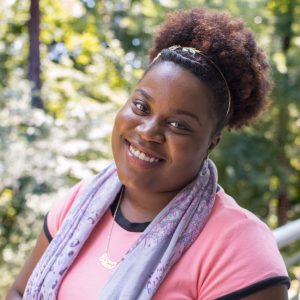Diamond Ebanks Holloman is a doctoral candidate in the Environment, Ecology, and Energy Program. She earned her bachelor’s degrees from New York University in environmental studies and journalism, and a master’s degree from her current program. Her community-based research focuses on the intersection of race, social vulnerability, the environment, and the movement of water. She is the recipient of the Royster Final Year Fellowship, the McColl Dissertation Fellowship through the Graduate School and Center for the Study of the American South, and an Impact Award winner. You can read more about the Impact Award in this magazine article here.

What made you choose UNC-Chapel Hill when deciding on a program/place to study?
One of the biggest reasons I chose UNC-CH was because of the program I am in, environment, energy, and ecology (at the time, named curriculum for the environment and ecology). It is an interdisciplinary ecology department, giving me the flexibility to discover more of environmental social science without some of the disciplinary restrictions that are sometimes encouraged elsewhere. I was very much enticed by the rigor of the program – the academic side of things – and didn’t necessarily consider the social or more holistic aspects of graduate education. So, I feel lucky Kathy called me over to the IME table at the club fair before classes started my first year. I was meandering between tables when I came across the IME table, spoke with the ever-energetic and amazing Kathy Wood, and learned about the initiative. At the time, I didn’t know how much of an impact it would have on me. IME was, and still is, very much a staple of my graduate career here at UNC. Without the guidance, institutional knowledge, and connections I’ve made in IME, I know my UNC-CH experience would not have been the same.
Tell us about your research.
My research centers on the experiences of marginalized groups after disasters, and asks: how can society better serve these communities and enhance their resilience to natural disasters? When disasters occur – like hurricanes, for example – racially marginalized groups tend to have access to fewer financial resources and less control over their surrounding infrastructure. Focusing on the aftermath of Hurricanes Matthew in 2016 and Florence in 2018, my dissertation looks at how African American and Native American (Lumbee) communities in Robeson County, NC negotiate the difference between government assistance and their actual needs. If society can recognize this local organizing as climate adaptation, larger entities can pour resources into these strategies that better support these communities in long-term recovery.
How have you built community as a graduate student at Carolina?
Building community wasn’t something I thought about in my first year until it was thrust upon me – I didn’t know I needed a group of dope people around me to not just build friendships, but to support me through the inevitable hurdles of grad school. First, building community looked like attending and engaging in IME events and activities. I was studying and eating breakfast snacks at Writing Wednesday every week, carving pumpkins on Halloween, and dancing at the end-of-the-year celebration. Then, it turned into me having the opportunity to work as a graduate assistant for the initiative, where I could put some of my event-planning skills to good use. In that role, I had the honor to form the Sisterhood for Empowerment in Academe (SEA) for women of color in graduate school – that was a joy! I’ve now passed that role on to another amazing woman and friend and have continued with my tribe who now make up my accountability groups, writing groups, and safe spaces. During the pandemic, which has been especially isolating, having these groups of people to check-in and meets virtually with is a privilege that I don’t take for granted!
What are you hoping to accomplish with your Carolina degree?
I think there are large, resilience-focused organizations that could do a better job supporting and bolstering racially marginalized communities after a disaster. I want to use the knowledge and skills I’ve gained working with community members in Robeson County to not only amplify the voices of smaller, local groups and solutions but to also help these larger organizations and municipalities create holistic plans for long-term preparedness and recovery to disaster. Whether that be as a consultant or a permanent position within these large entities, I want to continue to center and amplify the strategies that racially marginalized communities have used for generations. I want to work within these communities’ particular historical and social contexts to provide them the resources they know will work for their communities in order to make lasting – positive – change.
Describe Initiative for Minority Excellence in five words.
Aspirational, Fulfilling, Supportive, Vital, Clutch
